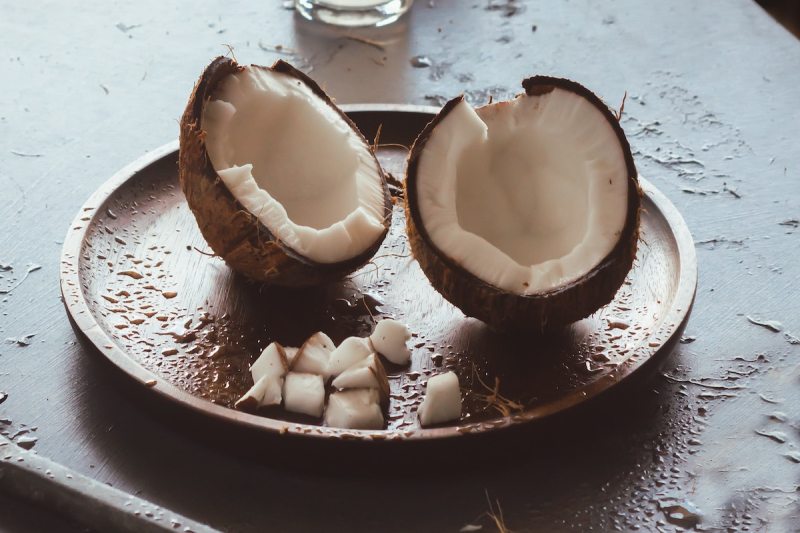
Coconuts grow on coconut palm trees in tropical climates. The edible part of a coconut, including the milk and coconut water, is protected and concealed within a hard, fibrous shell. You can eat the coconut itself straight or add it to various dishes such as curries and even desserts.
Across the globe and far away from where coconuts are harvested, a whole fresh coconut is still considered exotic. However, coconuts are becoming easier to find and are popular because of their tasty white flesh. Although coconut is high in saturated fat, to compensate, it does contain nutrients such as manganese and selenium, and coconut is also a great source of fiber.
Coconut milk comes from a fully ripened coconut, while coconut water is obtained from coconuts that are not fully matured and are still green on the outside. Coconut water is highly sought after because it is good for your health, even more so than coconut milk. With this in mind, here is a look at seven of the main possible health benefits of coconut water.
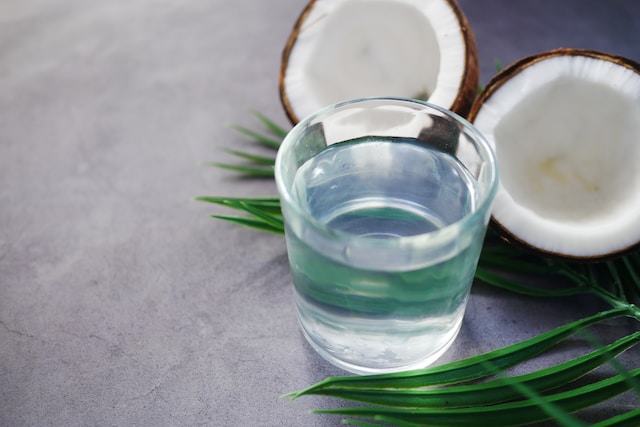
What is coconut water?
Coconut water is sometimes confused with coconut milk and even coconut oil. As already mentioned, coconut milk is obtained from a fully matured coconut, while coconut water comes from coconuts that still have a green outer shell. Coconut milk is high in fat, but this is not the case with coconut water.
Coconut water is a clear liquid that is fat-free and cholesterol-free, and it has more potassium than bananas! It’s also great for hydration, and this is all down to the level of electrolytes it contains. Coconut water is more effective than sports drinks for rehydration, and it comes ready-made and is free of additives and high sugar content.
An average glass of coconut water contains 44 calories, 10.4 grams of carbohydrates, 0 grams of fat, 0.5 grams of protein, and 9.6 grams of natural sugars.
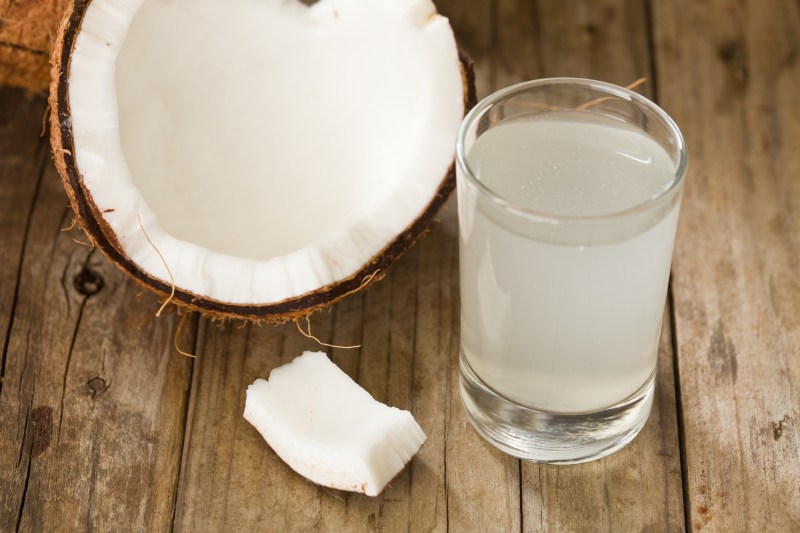
8 benefits of regularly drinking coconut water
1. Excellent for hydration
The high electrolyte content of pure coconut water makes it highly beneficial for those who want to stay hydrated throughout the day, or who urgently need rehydration following a workout, illness, or being in direct contact with hot temperatures and high humidity.
The electrolytes present in coconut water include sodium, magnesium, calcium, and potassium. These electrolyte minerals are vital to the proper functioning of the nervous system, organs, and overall body. Electrolytes are also needed so that muscles can contract adequately. Furthermore, electrolytes can help maintain the body’s pH balance between acidity and alkalinity.
2. Promotes healthy skin
Coconut water contains B vitamins and other vitamins such as vitamin C; all of these benefit the health of the skin. In addition, since coconut water aids in body hydration, it also helps to keep skin hydrated and healthy, too!
If you are worried about wrinkles, then you will be happy to hear that coconut water has an anti-aging effect on the skin. The nutrients in coconut water help maintain the skin’s elasticity and increase collagen production which helps to promote healthy, glowing skin. It is also thought that coconut water has antimicrobial properties, which can make it an asset in treating skin infections and other common skin ailments like acne.
3. Tool for weight loss
Coconut water is naturally fat-free, low in sugars, and low in calories, making it a diet-friendly drink. It also contains enzymes that aid digestion and help to speed up metabolism. This in turn increases calorie and fat burning within the body.
Coconut water is best for weight loss when it is consumed as part of an all-around diet regime that includes healthy eating and regular exercise. It can also suppress the appetite and is best drunk on an empty stomach in the morning. This helps boost the metabolism even before any activity has been undertaken.
4. Source of electrolytes
Coconut water, as we have already discovered, is an excellent source of hydration-promoting electrolytes. The three significant electrolytes are sodium, potassium, and chloride. Coconut water contains two of these, making it a helpful drink if your electrolyte levels are ever compromised.
It is important to maintain a balanced level of electrolytes as levels that are too high or too low can cause illness, and you may experience the negative symptoms of dehydration. When you sweat, you lose electrolytes, and these need to be regularly replaced. Coconut water is a quick and nutritious way of replenishing them and helping you avoid many unpleasant symptoms!
5. High in nutrients
Coconut water contains various minerals, vitamins, and antioxidants, such as shikimic acid and caffeic acid. These antioxidants help to neutralize the damage that can be caused by free radicals that are produced in the cells during cell metabolism. Coconut water is also a major source of potassium, which helps balance the cells’ fluid levels. Potassium helps muscles contract and supports normal blood pressure levels, too.
The nutritional profile of coconut water also includes B vitamins that help maintain the normal function of the nervous system, vitamin C, which helps keep skin healthy, and other minerals such as calcium. This particular mineral is vital for strong bones and bone health in general.
6. Supports kidney health
Research suggests that regular consumption of coconut water might even help prevent the formation of kidney stones. These stones can cause excruciating pain and disturb the kidneys’ normal functioning. They are created when minerals such as calcium and salts such as oxalates form crystals in the urine. Once these are deposited in the kidneys, symptoms can occur.
There are four main types of kidney stones: Calcium stones, struvite stones, uric acid stones, and cystine stones. Medical conditions such as diabetes, dietary factors, and even hereditary illnesses can lead to the formation of kidney stones.
It is thought that regular consumption of coconut water can help prevent the formation of stones by reducing the number of crystals in urine. Coconut water could also possibly prevent crystals from sticking to the kidneys and other parts of the urinary tract.
7. Healthy alternative to sugary drinks
The problem with hydrating sports drinks is that they are often loaded with sugar, preservatives, and other additives. Some even combine glucose syrup with artificial sweeteners. Then, there are added stimulants, such as caffeine, to contend with.
Coconut water in its natural state contains no chemical additives, and it is sweet enough on its own, so there is no need to add any sweeteners or other artificial ingredients to the water. It also contains vitamins and minerals that are needed by the body daily to keep it healthy, and these are often missing in sugary drinks.
8. Blood sugar management
There is promising information about coconut water and blood sugar management. Studies on rats suggest coconut water may improve blood sugar control.
Researchers believe components like potassium, magnesium, manganese, vitamin C, and L-arginine might enhance insulin sensitivity, potentially leading to lower blood sugar levels. Coconut water is generally lower in sugar than sugary drinks and has a lower glycemic index, meaning it likely causes a smaller blood sugar spike.
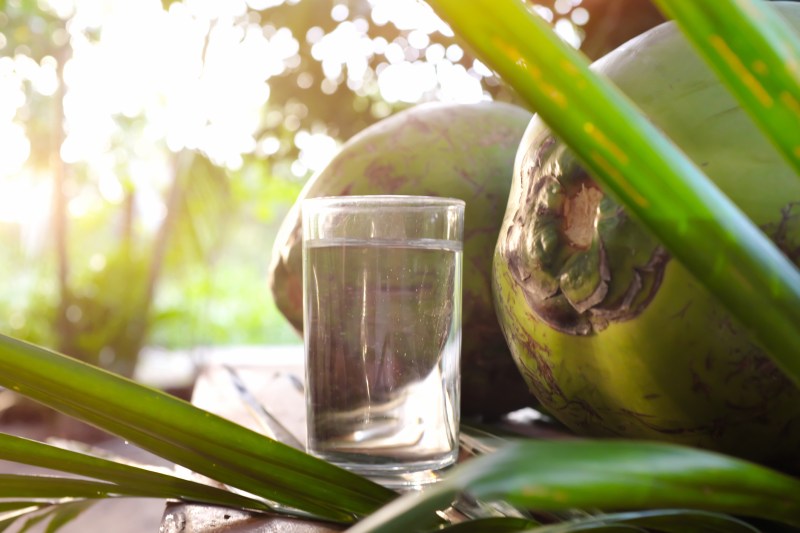
How can you incorporate coconut water into your diet?
There are many branded forms of coconut water on the market. The ones that are best are those that are additive-free and unsweetened. Make sure the coconut water you buy is not from concentrate. There are brands that ethically source the water and are often also certified as organic. Some coconut waters come with pulp, while others are pure water, so it can be similar to picking your perfect orange juice.
Coconut water and fruit juices such as pineapple and orange juice combine well and help to keep things healthy, especially if the fruit juice is pure and unsweetened. Coconut lemonade is also popular and great to drink on a hot summer afternoon!
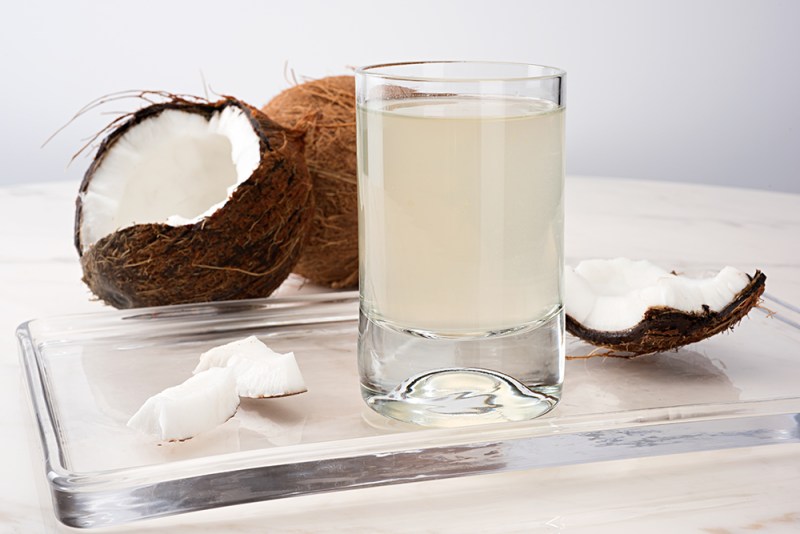
Is coconut water for you?
Coconut water in its pure form is a healthy alternative to sugary drinks, such as sports hydration formulas. It contains no additives and is packed with nutrients and electrolytes that help prevent dehydration. Other positives include the fact that coconut water is a fat-free drink and low in sugar and calories.
Coconut water is an excellent beverage for those who are on a weight loss program because it can help suppress the appetite and speed up metabolism. Other possible health benefits attributed to coconut water include the prevention of kidney stones and the promotion of healthy, glowing skin, so try some for yourself today!



